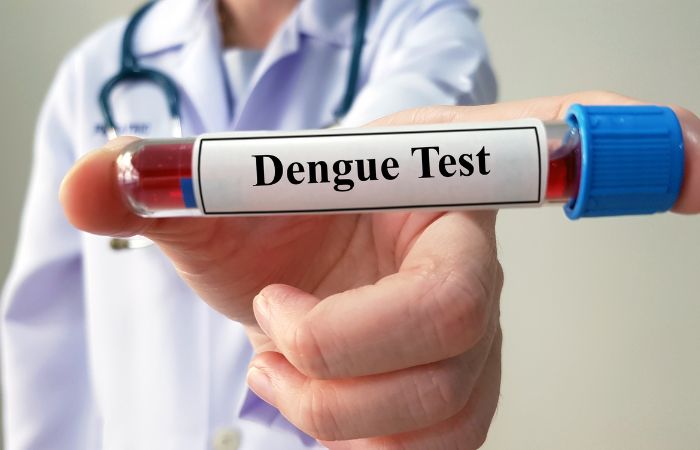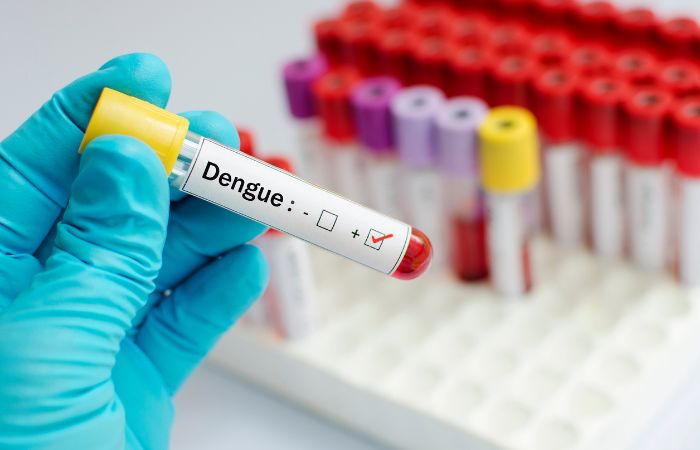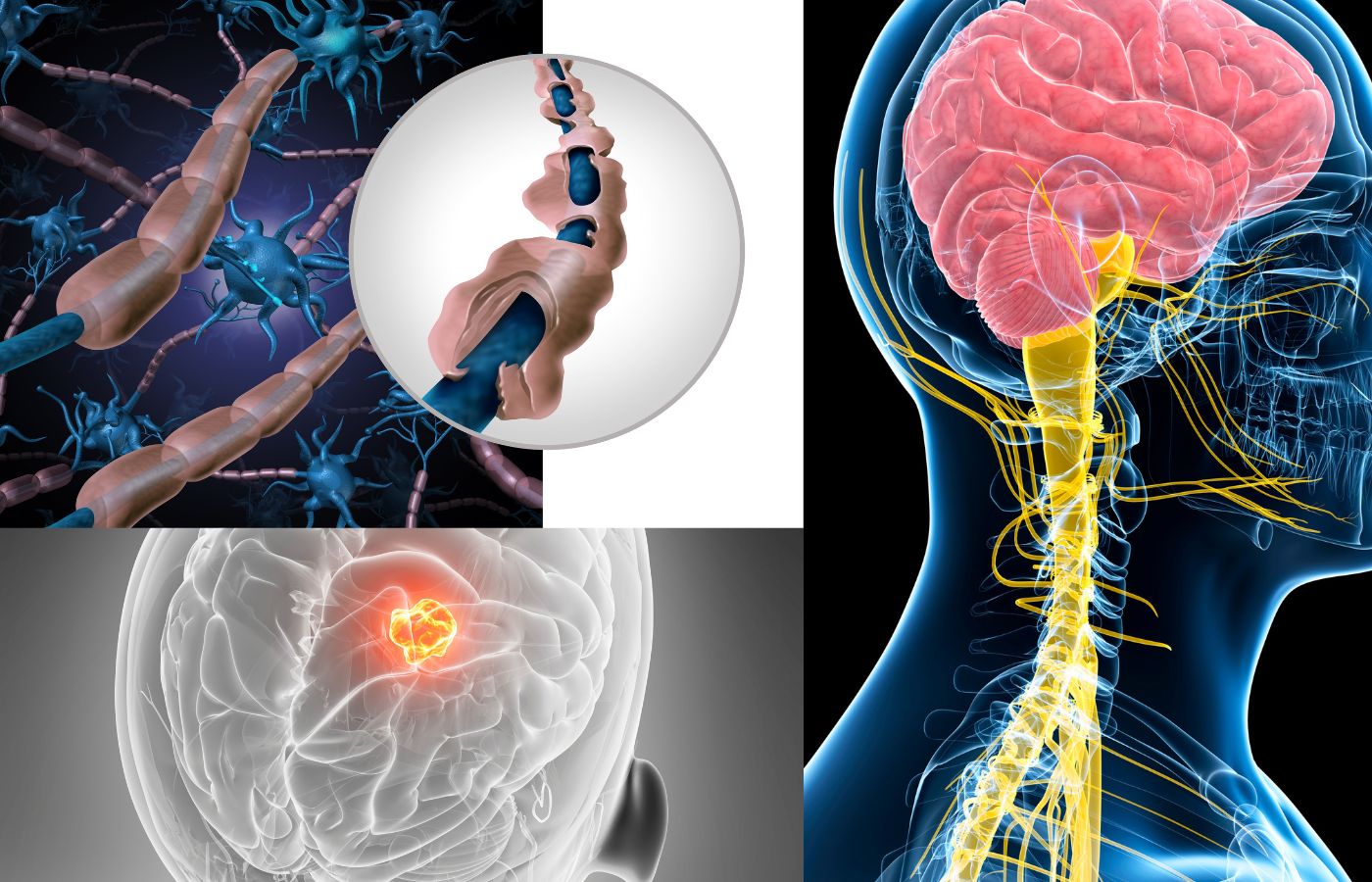
Dengue is a mosquito-borne viral disease that has become a significant public health concern in tropical and subtropical regions. Timely recognition of its symptoms is crucial for prompt medical attention and effective management. Often mistaken for common viral fevers, dengue disease can escalate into severe conditions if left untreated.
Dengue is caused by the dengue virus, which is transmitted to humans through the bite of infected female Aedes aegypti mosquitoes. The disease can present as mild dengue fever or progress to more severe forms, such as dengue hemorrhagic fever (DHF) or dengue shock syndrome (DSS).
Early detection of dengue disease is essential to manage the symptoms and prevent complications. Diagnostic tools like a dengue test play a critical role in confirming the presence of the virus.
Dengue manifests in several stages, each with distinct symptoms. Recognizing these early signs can help prevent the disease from progressing to a severe stage.
1. High Fever
A sudden onset of high fever, often reaching 104°F (40°C), is one of the earliest and most prominent symptoms of dengue.
2. Severe Headache
Intense headaches, particularly around the eyes (retro-orbital pain), are common during the initial stages of dengue fever.
3. Joint and Muscle Pain
The virus causes severe joint and muscle pain, earning dengue the nickname "breakbone fever."
4. Skin Rash
A distinctive red rash often appears a few days after the fever begins. It may initially resemble a measles-like rash and later turn into pinpoint red spots due to blood vessel damage.
5. Fatigue and Weakness
Dengue patients often feel extreme fatigue and weakness, even after the fever subsides.
6. Nausea and Vomiting
Nausea and vomiting are common and can contribute to dehydration if not managed properly.
7. Swollen Glands
Swelling in lymph nodes, particularly in the neck and groin, is another symptom observed in some patients.
8. Bleeding Symptoms (In Severe Cases)
In severe cases, dengue can lead to bleeding gums, nosebleeds, or blood in the stool or urine, indicating a progression to dengue hemorrhagic fever.

Timely recognition of dengue symptoms is crucial to prevent complications and ensure proper medical intervention. Mild dengue can usually be managed with supportive care, but severe cases require hospitalization and close monitoring.
Getting a dengue blood test as soon as symptoms appear helps confirm the diagnosis, allowing healthcare providers to initiate the appropriate treatment plan.
A dengue test is essential for confirming the presence of the dengue virus in the bloodstream. There are several types of tests available:
1. NS1 Antigen Test
This test detects the presence of the dengue virus in the early stages, often within the first few days of fever onset.
2. IgM and IgG Antibody Tests
These blood tests identify antibodies produced by the body in response to the dengue virus. IgM antibodies indicate a recent infection, while IgG antibodies may suggest a past infection.
3. Complete Blood Count (CBC)
A CBC test monitors platelet levels and hematocrit values, which are crucial in managing severe dengue cases. A significant drop in platelet count is a common indicator of dengue.
Finding a trusted diagnostic center for a pathology test near me is vital for accurate and timely results. At Diagnopein, we provide comprehensive diagnostic services, including dengue blood tests, at our centers in Mumbai, Nagpur, and Delhi. Our advanced laboratories and skilled professionals ensure reliable results, helping doctors diagnose and treat dengue disease effectively. The cost of a dengue test starts from Rs. 500/- but also depending on the type of test performed and the location. At Diagnopein, we offer affordable dengue testing services, ensuring accessibility for everyone.
Once dengue is diagnosed, follow these steps to manage the disease effectively:
1. Stay Hydrated
Dehydration is a significant concern in dengue. Drink plenty of fluids, including water, coconut water, and electrolyte solutions, to maintain hydration.
2. Rest and Recovery
Bed rest is essential to allow the body to recover. Avoid strenuous activities that could worsen fatigue or muscle pain.
3. Monitor Symptoms
Keep track of symptoms, especially signs of severe dengue, such as persistent vomiting, abdominal pain, or bleeding. Seek immediate medical attention if these occur.
4. Avoid NSAIDs
Medications like aspirin and ibuprofen should be avoided, as they can increase the risk of bleeding. Paracetamol is a safer option for managing fever and pain.
While early recognition and treatment are critical, prevention is the best way to combat dengue. Here are some tips to reduce the risk of infection:
1. Avoid Mosquito Breeding Grounds
Empty stagnant water from containers, flowerpots, and drains to prevent mosquito breeding.
2. Use Mosquito Repellents
Apply mosquito repellents and use mosquito nets to protect yourself, especially during peak mosquito activity times.
3. Wear Protective Clothing
Long-sleeved shirts and long pants provide an extra layer of protection against mosquito bites.
4. Community Efforts
Participate in community cleanup drives to eliminate breeding grounds and educate others about dengue prevention.
At Diagnopein, we are committed to providing accurate and timely diagnostic services for dengue disease. Here’s why you should choose us:
1. Expertise and Accuracy
Our highly trained professionals and advanced equipment ensure precise results, aiding in early and effective treatment.
2. Convenient Locations
With diagnostic centers in Pune, Mumbai, Delhi, and Nagpur, we make it easy for you to find a dengue test near me and access reliable healthcare services.
3. Affordable Pricing
We offer competitive pricing for dengue tests, ensuring affordability without compromising on quality.

